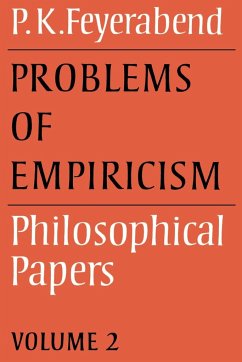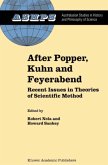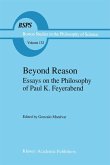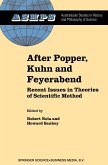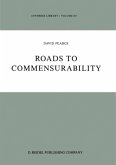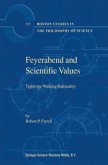Over the past thirty years Paul Feyerabend has developed an extremely distinctive and influentical approach to problems in the philosophy of science. The most important and seminal of his published essays are collected here in two volumes, with new introductions to provide an overview and historical perspective on the discussions of each part. Volume 1 presents papers on the interpretation of scientific theories, together with papers applying the views developed to particular problems in philosophy and physics. The essays in volume 2 examine the origin and history of an abstract rationalism, as well as its consequences for the philosophy of science and methods of scientific research. Professor Feyerabend argues with great force and imagination for a comprehensive and opportunistic pluralism. In doing so he draws on extensive knowledge of scientific history and practice, and he is alert always to the wider philosophical, practical and political implications of conflicting views. These two volumes fully display the variety of his ideas, and confirm the originality and significance of his work.
Table of contents:
1. Historical background: some observations on the decay of the philosophy of science; 2. Classicl empiricism; 3. The structure of science; 4. Two models of epistemic change: Mill and Hegel; 5. Philosophy of science versus scientific practice: observations on Mach, his followers and his opponents; 6. Mach, Einstein and the Popperians; 7. Wittgenstein's Philosophical Investigations; 8. Consolations for the specialist; 9. Popper's Objective Knowledge; 10. The methodology of scientific research programmes; 11. More clothes from the emperor's bargain basement: a review of Laudan's Progress and its Problems; Sources; Name index; Subject index.
Volume 1 presents papers on the interpretation of scientific theories, together with papers applying the views developed to particular problems in philosophy and physics. The essays in volume 2 examine the origin and history of an abstract rationalism, as well as its consequences for the philosophy of science and methods of scientific research.
Hinweis: Dieser Artikel kann nur an eine deutsche Lieferadresse ausgeliefert werden.
Table of contents:
1. Historical background: some observations on the decay of the philosophy of science; 2. Classicl empiricism; 3. The structure of science; 4. Two models of epistemic change: Mill and Hegel; 5. Philosophy of science versus scientific practice: observations on Mach, his followers and his opponents; 6. Mach, Einstein and the Popperians; 7. Wittgenstein's Philosophical Investigations; 8. Consolations for the specialist; 9. Popper's Objective Knowledge; 10. The methodology of scientific research programmes; 11. More clothes from the emperor's bargain basement: a review of Laudan's Progress and its Problems; Sources; Name index; Subject index.
Volume 1 presents papers on the interpretation of scientific theories, together with papers applying the views developed to particular problems in philosophy and physics. The essays in volume 2 examine the origin and history of an abstract rationalism, as well as its consequences for the philosophy of science and methods of scientific research.
Hinweis: Dieser Artikel kann nur an eine deutsche Lieferadresse ausgeliefert werden.

